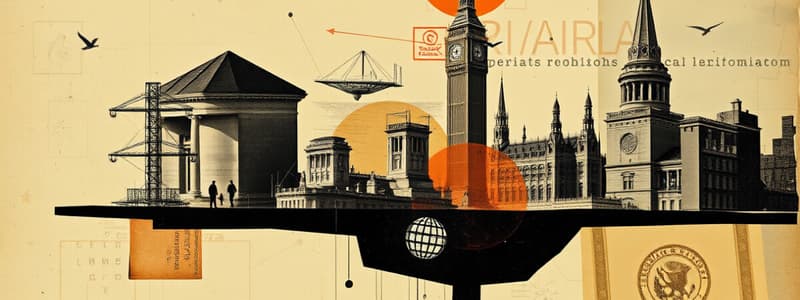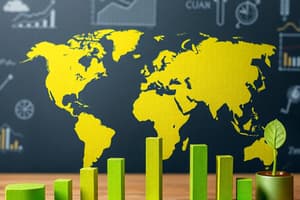Podcast
Questions and Answers
What is microeconomics?
What is microeconomics?
Microeconomics is the study of small economic units, how individuals, households, and firms make decisions and allocate resources.
What does macroeconomics study?
What does macroeconomics study?
- Individual consumer behavior
- Behavior of small economic units
- The entire economy or its subdivisions (correct)
- Household management
Scarcity means that the wants for goods are equal to the limited resources available.
Scarcity means that the wants for goods are equal to the limited resources available.
False (B)
___ is the process of creating goods and services.
___ is the process of creating goods and services.
What are the factors of production?
What are the factors of production?
Labor refers only to physical resources.
Labor refers only to physical resources.
Define distribution in economics.
Define distribution in economics.
What are renewable resources?
What are renewable resources?
What is exchange in the context of economics?
What is exchange in the context of economics?
Flashcards are hidden until you start studying
Study Notes
Introduction to Applied Economics
- Microeconomics studies small economic units, focusing on decisions made by individuals, households, and firms regarding resource allocation.
- Key areas of microeconomics include competitive markets, labor markets, and personal decision-making.
Economics as a Social Science
- Social sciences, including economics, examine human behavior and societal issues related to production, finance, and resource management.
- Macroeconomics differs by analyzing the economy as a whole, covering topics like national growth, inflation, and unemployment.
- Economics originates from the Greek term "Oikonomos," meaning household management.
Scarcity and Choice
- Scarcity arises when wants exceed limited resources, requiring decisions on resource allocation.
- Effects of scarcity include:
- The necessity of making choices.
- The need for a rationing device (price mechanism).
- Increased competition for limited goods and services.
Economic Activities
- Production: The process of creating goods and services, transforming raw materials into finished products.
- Distribution: Allocating the output of production to the owners of the factors of production.
Factors of Production
- Land (Natural Resources): Includes tangible resources like lumber and oil, divided into:
- Renewable resources (e.g., trees that can be replanted).
- Non-renewable resources (e.g., coal that cannot be replaced).
- Labor (Human Resources): Involves the physical and mental contributions of people in the production process.
- Capital: Refers to the tools and buildings used to create goods.
Entrepreneurship
- Defined as the ability to organize land, labor, and capital to produce goods, discover new business opportunities, and innovate methods of production.
- Entrepreneurs are pivotal in transforming ideas into tangible goods and services.
Exchange
- The process of delivering finished goods from producers to end-users is essential for economic activity and market function.
Studying That Suits You
Use AI to generate personalized quizzes and flashcards to suit your learning preferences.




